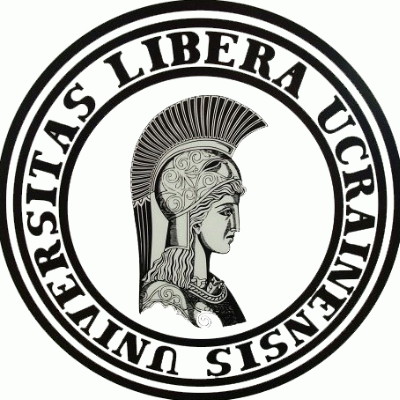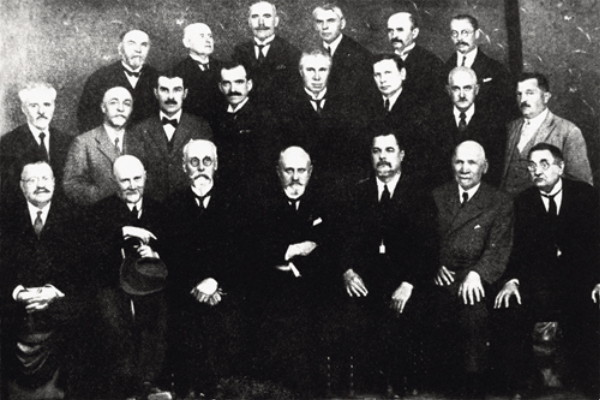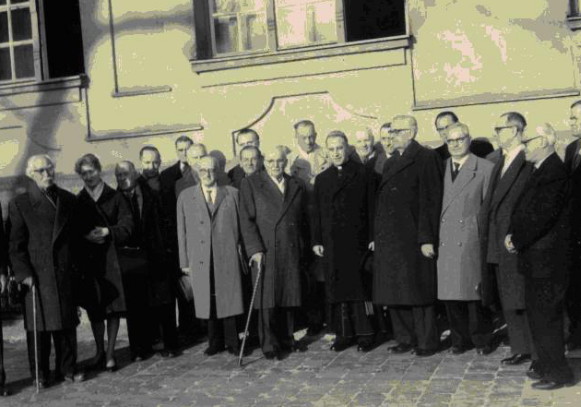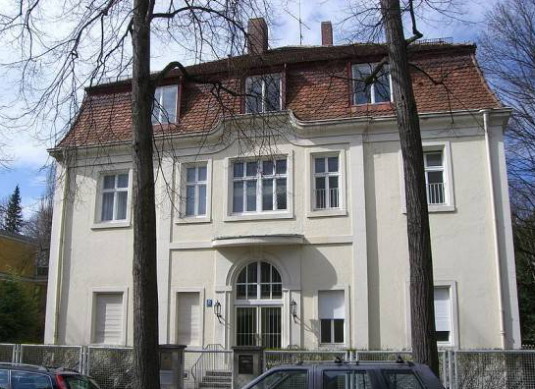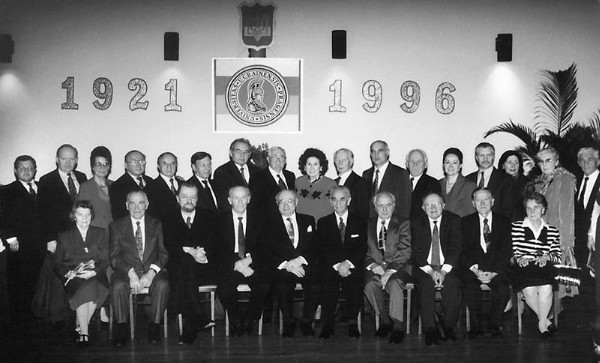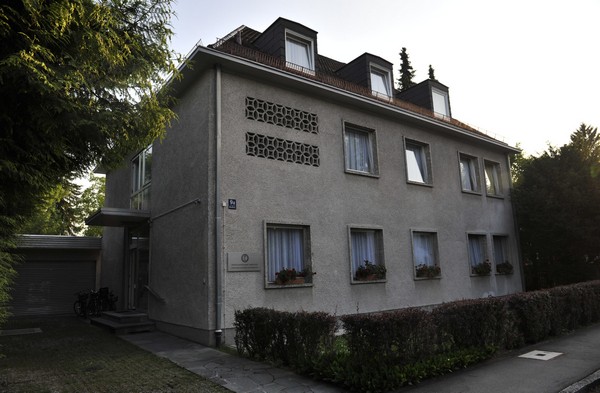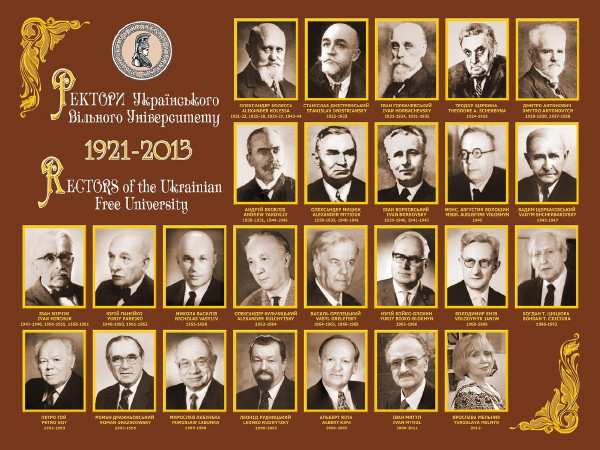Ukrainian Free University
Ukrainian Free University (Український вільний університет; Ukrainskyi vilnyi universytet, or УВУ; UVU). An institution devoted to the development of Ukrainian scholarship and postsecondary studies free of the political influences that dominated Soviet Ukraine, inaugurated on 17 January 1921 in Vienna. It emerged through the initiative of the Union of Ukrainian Journalists and Writers Abroad, the Ukrainian Sociological Institute, and the Society of Friends of Education in Vienna and was to work parallel with the Lviv (Underground) Ukrainian University. The initiative was supported by professors of former Austrian universities, who influenced its formation along traditional lines. Oleksander Kolessa was its first rector, and his traditionalism in education won out over the project of a people’s university, put forward by Mykhailo Hrushevsky.
The faculty in the UVU’s initial stages consisted of 12 professors and 3 lecturers. Initial enrollment was low (90 students) because the principal centers of Ukrainian emigration at the time were Prague and other Czechoslovak locales. The founders hoped to tap the potential in Czechoslovakia for students and for financial support for the institution, which did not exist in Vienna. As a result of the efforts of Volodymyr Starosolsky, the dean of the Faculty of Law, in conjunction with his association with Jaromir Nečas and the president of the Czechoslovak Republic and active supporter of Slavic studies Tomáš Garrigue Masaryk, the UVU was relocated to Prague. Official negotiations of this transfer were carried out by Oleksander Kolessa, Stanyslav Dnistriansky, and the premier of the Czechoslovak Republic, J. Černý.
The Czechoslovak government guaranteed financial assistance (including scholarships for students) and the right to use the resources of Charles University. The UVU was also officially recognized by the Ministries of Foreign Affairs and Education (16 and 30 September 1921). Upon its transfer the university was limited to two faculties, philosophy and law.
In 1921–2 the faculty was expanded to include 16 professors, 4 docents, and 1 lecturer. By 1931 it had expanded to include 39 members. Enrollment had increased from the initial 702 to 874 by 1922–3, and many students studied at both the UVU and Charles University. As the first Ukrainian postsecondary institution in Prague, the UVU became the center of Ukrainian academic life in the Czechoslovak Republic, the point of departure for many postsecondary institutions, academic institutes, and scientific societies. Every rector of the UVU also served as head of the governing Ukrainian Academic Committee. By the late 1920s the UVU’s library had expanded to include 10,000 titles, and its press had issued 27 monographs. The latter included jubilee anthologies in honor of Tomáš Garrigue Masaryk and three collections of the faculty’s works.
In the 1930s the institution underwent a crisis, because the Czechoslovak government’s rapprochement with the Soviet Union and Poland resulted in limitations on the rights given to Ukrainian political émigrés. Saved from dissolution through the efforts of its rector, Ivan Ya. Horbachevsky, the UVU’s financial resources forced it to cut back on publishing. Other difficulties arose because of a decline in enrollment, which fell to 61 in 1939. Some hope was rekindled when Subcarpathian Ruthenia was granted autonomy in 1938.
After the partition of the Czechoslovak Republic the UVU was placed under the jurisdiction of the new, German rector of Charles University. Enrollment rose when students began arriving from the Generalgouvernement (107 in 1940–1). As a result Volodymyr Kubijovyč, head of the Ukrainian Central Committee, secured monthly grants and financing for the institution’s press. In the final stages of the UVU’s stay in Prague, the faculty consisted of 20 professors, 10 docents, and 3 lecturers. In 1921–41, 37 doctorates in philosophy and 95 in law were conferred.
In the years 1921–45 the rectors were Oleksander Kolessa (1921–2, 1925–8, 1935–7, 1943–4), Stanyslav Dnistriansky (1922–3), Ivan Ya. Horbachevsky (1923–4, 1931–5), Fedir Shcherbyna (1924–5), Dmytro Antonovych (1928–30, 1937–8), Andrii Yakovliv (1930–1, 1944–5), Oleksander Mytsiuk (1938–9, 1940–1), Ivan Borkovsky (1939–40, 1941–3), and Rev Avhustyn Voloshyn (1945). The institution’s Prague period came to an end when the city was occupied by the Soviet Army in May 1945. Yakovliv handed over the rectorship to Voloshyn (who believed in continuing activities in Czechoslovakia), and together with most of the faculty emigrated westward. Voloshyn’s hopes proved illusory. He was arrested, and died in prison; the UVU was liquidated, and its assets plundered.
Through the initiative of Vadym Shcherbakivsky and a group of scholars of the Ukrainian Scientific Institute in Berlin (including its director, Ivan Mirchuk) the UVU was re-established in Munich in 1946. Its faculty was expanded to include émigré scholars from central and eastern Ukraine. In 1947 the faculty consisted of 44 professors, 16 lecturers, and 18 teaching assistants. The highest level of enrollment (493) was reached in 1947–8. The revival of the UVU was funded by donations from the Ukrainske Vydavnytstvo (Cracow) and the Congregation for Eastern Churches (gathered by Bishop Ivan Buchko, who became the UVU’s curator). Instruction continued in law and philosophy, as did publishing, which focused primarily on the printing of textbooks and original manuscripts (27 titles by 1950). In 1946–56, 206 doctorates and 103 masters degrees were conferred. On 16 September 1950 the Bavarian Ministry of Education and Religion officially recognized the UVU as a private university.
The monetary reforms in Germany, instituted in June 1948, complicated the financial status of displaced persons and prompted the emigration of professionals and students to North America. This course of events had a negative impact on the UVU, whose enrollment declined to 272 in 1949 and 137 in 1950. Classroom instruction was cut back sharply, and eliminated altogether in 1956. The UVU sought to compensate for this curtailment by establishing the Institute for Correspondence Education, establishing firmer ties with former faculty members in institutions in Canada, France, and the United States of America, and fortifying its publishing house. In 1957 it began publishing the journal Zapysky Ukraïns’koho vil’noho universytetu.
Oleksander Kulchytsky of the UVU and others established the Association for the Advancement of Ukrainian Studies in 1962, and the new association gave rise to greatly improved conditions for the institution. Yurii Blokhyn (rector) was able to reintroduce classroom instruction in 1965, and Volodymyr Yaniv (rector), to expand it further, to include summer and winter courses in general Ukrainian studies, pedagogy, basic linguistics, and Eastern European studies in English (in co-operation with Michigan State University). The faculty increased from 56 members in 1965 to 92 in 1990. Most members live outside of Munich but participate in the summer semester. In the years 1968–81, 1,585 students, from 17 countries, enrolled in UVU programs. The large increase in enrollment was made possible by the acquisition of a building for the university in 1974 with funds from a donation made by Cardinal Yosyf Slipy, the expansion of a foundation in Canada and the United States of America, and contacts with non-Ukrainian scholars.
Between 1972 and 1989 the UVU organized 189 conferences, including a commemorative conference on Hryhorii Skovoroda held in co-operation with universities in Germany, France, and Austria. Contacts with Belarusian, Bulgarian, Czech, Slovak, Jewish, and Polish academics proved particularly important. The UVU also held numerous art exhibitions.
In all, the UVU has published over 250 works since it established operations in Munich. In the years 1966–89 it conferred 116 doctoral and 44 masters degrees. In 1981 the Institute for the Study of Nationalities Problems was established, headed by Z. Sokoliuk. The university, now located near the Nymphenburg palace, presently has three faculties: philosophy, Ukrainian studies, and the government and political economy.
Notable members of the UVU faculty have included the historians Dmytro Doroshenko, Borys Krupnytsky, Oleksander Ohloblyn, Nataliia Polonska-Vasylenko, and Arkadii Zhukovsky; the geographers Volodymyr Kubijovyč and Stepan Rudnytsky; the philologists Oleksa Horbach, Oleksander Kolessa, Jaroslav Rudnyckyj, George Yurii Shevelov, and Stepan Smal-Stotsky; the scholars in philosophy Dmytro Chyzhevsky, Oleksander Kulchytsky, Ivan Mirchuk, and Volodymyr Yaniv; the ethnographers Zenon Kuzelia and Viktor Petrov; the art historians Dmytro Antonovych and Volodymyr R. Zalozetsky-Sas; the church historians Vasyl Bidnov, Mykola Chubaty, and Oleksander Lototsky; the jurists Stanyslav Dnistriansky, Otto Eikhelman, Rostyslav Lashchenko, Lev Okinshevych, Yaroslav Padokh, Yurii Paneiko, Volodymyr Starosolsky, and Andrii Yakovliv; and the economists Yevhen Glovinsky, Oleksander Mytsiuk, and Vladimir Timoshenko.
The rectors of the UVU since 1946 have been Vadym Shcherbakivsky (1946–7), Ivan Mirchuk (1947–8, 1950–5, 1956–61), Yurii Paneiko (1948–50, 1961–2), Mykola Vasyliv (1955–6), Oleksander Kulchytsky (1963), Vasyl Oreletsky (1964, 1966–8), Yurii Blokhyn (1965–6), Volodymyr Yaniv (1968–86), Theodore Ciuciura (1986–92), Petro Goy (1992–3), Roman Drazhniovsky (1993–5), Myroslav Labunka (1995–8), Leo Rudnytzky (1998–2003), Albert Kipa (2004–7), Ivan Myhul (2008–11), Yaroslava Melnyk (2012–15), and Maria Pryshliak (2016–).
BIBLIOGRAPHY
Ukraïns'kyi vil'nyi universytet v Prazi v 1921–1931, 2 vols (Prague 1931)
Narizhnyi, S. Ukraïns'ka emigratsiia: Kul'turna pratsia ukraïns'koï emigratsiï mizh dvoma svitovymy viinamy (Prague 1942)
‘Z diial'nosty UVU za druhe desiatylittia isnuvannia (1931–1941),’ Naukovyi zbirnyk UVU v Prazi, 3 (1942)
Mirchuk, I. ‘Ukraïns'kyi vil'nyi universytet,’ Naukovyi zbirnyk UVU, 5 (1948)
———. Ukraïns’kyi vil’nyi universytet: Korotkyi ohliad (Munich 1958)
Holiat, R. ‘Short History of the Ukrainian Free University,’ Papers of the Shevchenko Scientific Society, no. 21 (New York 1964)
Janiw, W. Ukrainische Freie Universität: Kurzgefasste Geschichte und dokumentarische Ergänzungen (Munich 1976)
Universitas Libera Ucrainensis: 1921–2011 (Munich 2011)
Volodymyr Yaniv
[This article was updated in 2015.]

